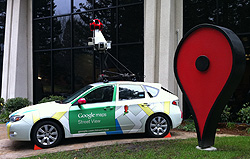Judge Rejects Google’s Motion To Toss Out Street View Lawsuit
Google is currently considering its options after a federal judge gave the go-ahead for a group of consolidated lawsuits to proceed against the company over a potential violation of the Federal Wiretap Act. Wednesday’s decision by US District Judge James Ware, first reported by Wired, actually dismissed two of the three claims against Google, but […]

Wednesday’s decision by US District Judge James Ware, first reported by Wired, actually dismissed two of the three claims against Google, but left open the group’s ability to sue Google for potentially violating the Wiretap Act:
… the Court finds that Plaintiffs plead facts sufficient to state a claim for violation of the Wiretap Act. In particular, Plaintiffs plead that Defendant intentionally created, approved of, and installed specially-designed software and technology into its Google Street View vehicles and used this technology to intercept Plaintiffs’ data packets, arguably electronic communications, from Plaintiffs’ personal Wi-Fi networks. Further, Plaintiffs plead that the data packets were transmitted over Wi-Fi networks that were configured such that the packets were not readable by the general public without the use of sophisticated packet sniffer technology. Although Plaintiffs fail to plead that the wireless networks fall into at least one of the five enumerated exceptions to Section 2510(16)’s definition of “readily accessible to the general public” for radio communications, the Court finds that the wireless networks were not readily accessible to the general public….
Google had argued that the case should be thrown out, in part, on a technicality that the wireless signals that it intercepted were a “radio communication” and were “readily accessible” because they were unencrypted, thus making the company’s actions exempt from the Wiretap Act. The judge disagreed, saying Google’s claim that it didn’t violate the act is “misplaced.”
The court did grant Google’s motion to dismiss claims that its action violated various state wiretap laws, saying that the federal Wiretap Act takes precedence, and also dismissed claims that Google violated California’s Business and Professional Code.
Asked about Wednesday’s ruling, a Google spokesperson gave us this statement:
We believe these claims are without merit and that the Court should have dismissed the Wiretap claim just as it dismissed the plaintiffs’ other claims. We’re still evaluating our options at this preliminary stage.
The lawsuit stems from Google’s collection of personal data over unsecured Wi-Fi networks via its Street View cars beginning in May 2007. As the cars drove around taking photographs, software installed on the cars also picked up personal information from unencrypted Wi-Fi networks. Later investigations found that Google had collected e-mail addresses and e-mails with usernames, passwords, home addresses, phone numbers and more. (See our Google Maps Privacy: The Street View & Wifi Scorecard for more background on this.)
Google has repeatedly apologized for the data collection and said it was accidental. The company also announced several changes to its internal privacy practices in late 2010.
Opinions expressed in this article are those of the guest author and not necessarily Search Engine Land. Staff authors are listed here.
Related stories
New on Search Engine Land